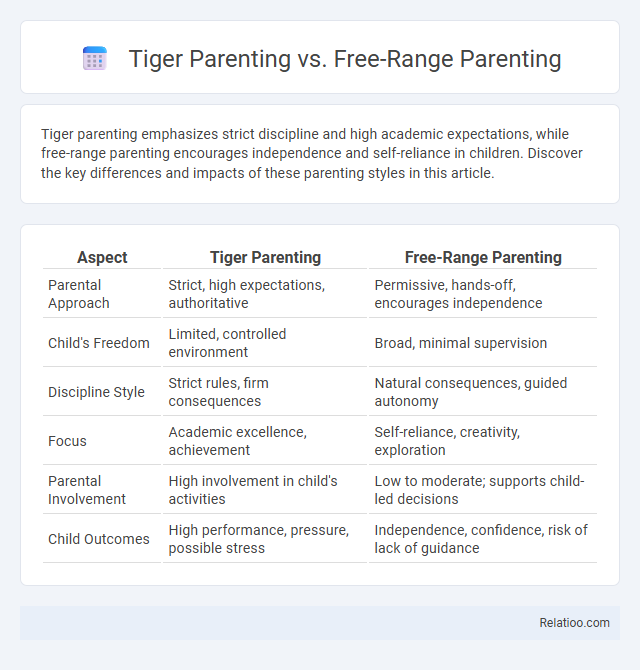Tiger parenting emphasizes strict discipline and high academic expectations, while free-range parenting encourages independence and self-reliance in children. Discover the key differences and impacts of these parenting styles in this article.
Table of Comparison
| Aspect | Tiger Parenting | Free-Range Parenting |
|---|---|---|
| Parental Approach | Strict, high expectations, authoritative | Permissive, hands-off, encourages independence |
| Child's Freedom | Limited, controlled environment | Broad, minimal supervision |
| Discipline Style | Strict rules, firm consequences | Natural consequences, guided autonomy |
| Focus | Academic excellence, achievement | Self-reliance, creativity, exploration |
| Parental Involvement | High involvement in child's activities | Low to moderate; supports child-led decisions |
| Child Outcomes | High performance, pressure, possible stress | Independence, confidence, risk of lack of guidance |
Understanding Tiger Parenting: Key Characteristics
Tiger parenting emphasizes strict discipline, high expectations, and rigorous academic achievement, often involving structured schedules and intense parental involvement. This approach contrasts with free-range parenting, which prioritizes child autonomy, independence, and experiential learning with minimal oversight. Understanding tiger parenting requires recognizing its focus on pushing children toward excellence through authoritative control and persistent demands for success.
What is Free-Range Parenting? An Overview
Free-Range Parenting emphasizes fostering independence and self-reliance in children by allowing them more freedom to explore and make decisions with minimal adult supervision. Unlike Tiger Parenting, which involves strict rules, high expectations, and intensive involvement in academic and extracurricular activities, Free-Range Parenting prioritizes developing problem-solving skills and resilience through real-world experiences. You can better understand your child's capabilities and encourage their growth by balancing guidance with autonomy.
Core Philosophies: Control vs Independence
Tiger parenting emphasizes strict control, high expectations, and disciplined routines to ensure academic and personal success, while free-range parenting prioritizes fostering independence, self-reliance, and risk-taking in children. The core philosophy of tiger parenting involves guided structure and close supervision, whereas free-range parenting supports autonomy with minimal interference. Your choice between these methods shapes how your child navigates responsibility and freedom within their developmental journey.
Academic Outcomes: Which Approach Wins?
Tiger parenting emphasizes strict discipline and high academic expectations, often resulting in superior test scores and college admissions rates compared to other styles. Free-range parenting promotes independence and self-directed learning, fostering creativity and problem-solving skills but sometimes correlating with less consistent academic achievement. Studies indicate tiger parenting yields the highest measurable academic outcomes, though it may come at the cost of increased stress and reduced emotional well-being.
Emotional Development in Tiger vs Free-Range Kids
Tiger parenting emphasizes strict rules and high expectations, often leading to increased academic achievement but potentially causing stress and anxiety that can hinder emotional development in children. Free-range parenting encourages independence and self-reliance, fostering emotional resilience and social skills through natural problem-solving and risk-taking experiences. Comparing both, children raised under free-range parenting generally exhibit stronger emotional regulation and confidence, while tiger parenting may limit emotional expression despite promoting discipline and achievement.
The Role of Discipline: Structure vs Freedom
Discipline in tiger parenting emphasizes strict rules, consistent routines, and high expectations to foster academic excellence and self-control, while free-range parenting prioritizes autonomy, allowing Your child to explore, learn from natural consequences, and develop independence. The role of discipline in tiger parenting creates structured environments that limit distractions and enforce obedience, contrasting with free-range methods that favor trust, minimal intervention, and experiential learning. Balancing structure with freedom impacts children's ability to manage responsibilities and adapt to social environments effectively.
Social Skills and Peer Relationships
Tiger parenting often emphasizes academic excellence and discipline but may limit your child's social skills development and peer relationships due to strict rules and high expectations. Free-range parenting encourages independence and exploration, fostering better social competence and stronger peer connections by allowing children to navigate social situations with minimal adult intervention. Striking a balance between the structured guidance of tiger parenting and the autonomy of free-range parenting can enhance your child's ability to build meaningful relationships and develop critical social skills.
Cultural Influences on Parenting Styles
Tiger parenting, characterized by strict discipline and high academic expectations, often stems from East Asian cultural values emphasizing perseverance and respect for authority. Free-range parenting, which encourages independence and risk-taking, reflects Western ideals of autonomy and self-reliance. Understanding these cultural influences helps You appreciate how parenting styles shape children's development within different societal contexts.
Potential Risks and Benefits of Each Approach
Tiger parenting emphasizes strict discipline and high expectations, potentially leading to academic excellence yet increasing risks of anxiety and reduced creativity. Free-range parenting promotes independence and self-reliance, fostering resilience and problem-solving skills while possibly exposing Your child to safety risks and insufficient guidance. Balancing these approaches can help optimize Your child's development by mitigating extremes and leveraging benefits.
Choosing the Right Style: Factors for Parents to Consider
Choosing the right parenting style depends on your child's temperament, developmental needs, and family values. Tiger parenting emphasizes strict discipline and high academic achievement, while free-range parenting promotes independence and risk-taking within safe boundaries. Balancing these approaches requires assessing your child's unique personality and your long-term goals for their growth and resilience.

Infographic: Tiger parenting vs Free-range parenting
 relatioo.com
relatioo.com